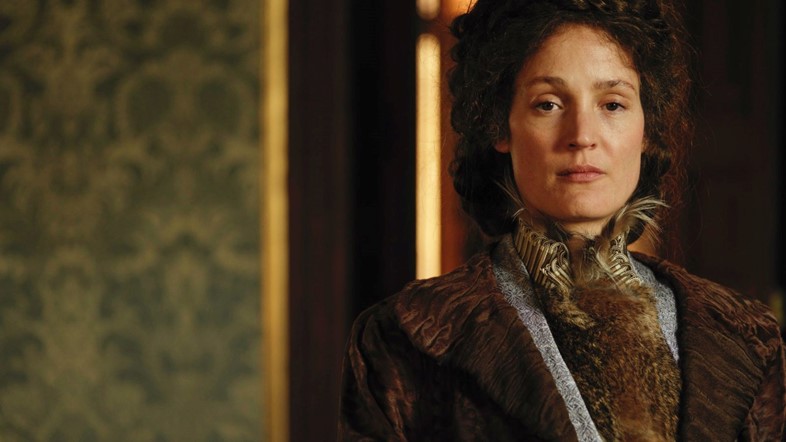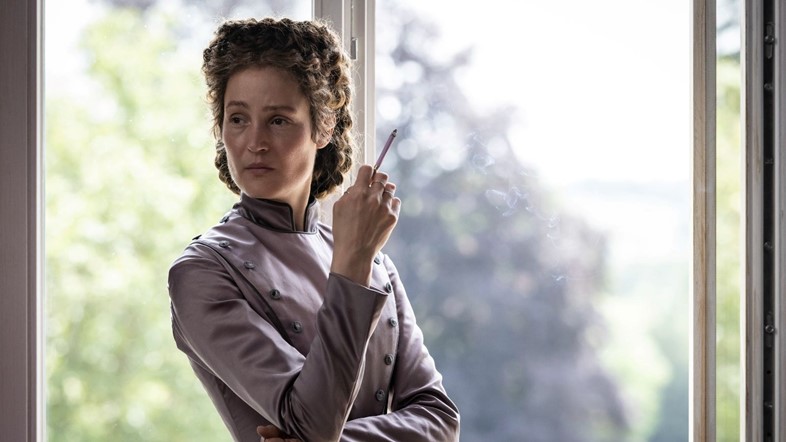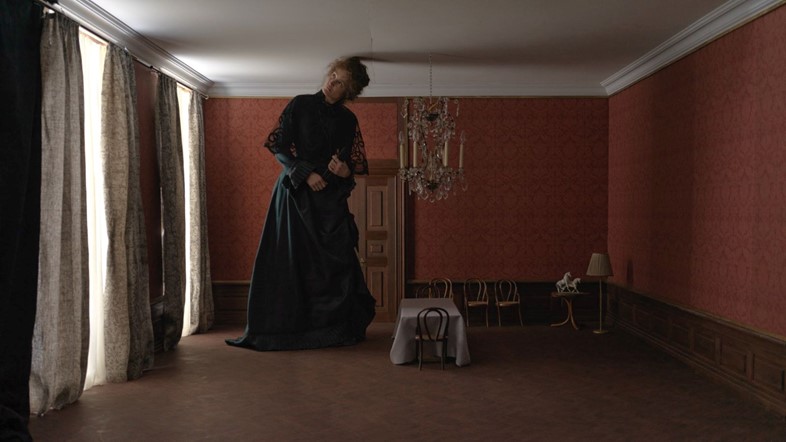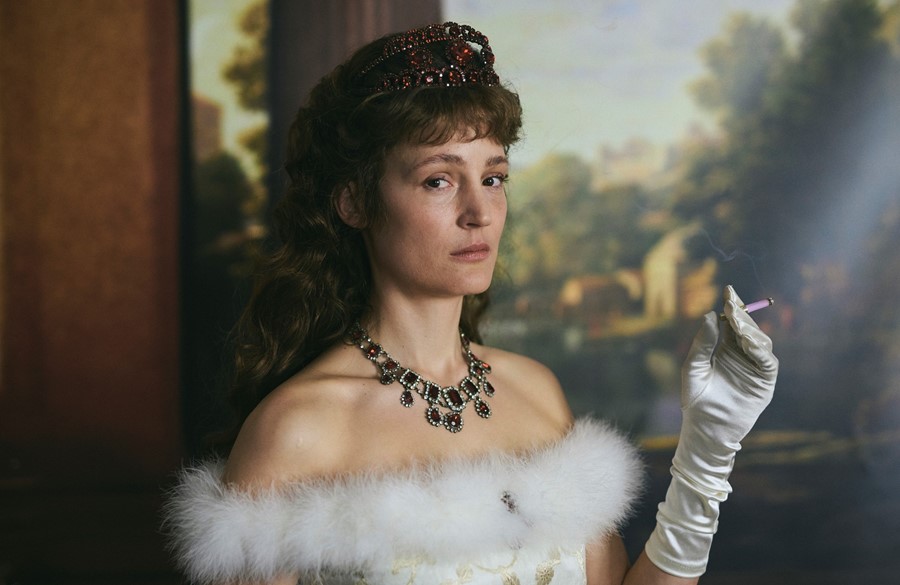In the new film Corsage, Phantom Thread star Vicky Krieps takes on the role of Empress Elisabeth of Austria, a “woman trapped inside an image of herself”
On 9 September 1898, Empress Elisabeth of Austria wrote in her diary of her wish “for my soul to escape to heaven through a tiny hole in my heart”. The next day she was dead, murdered on the shores of Lake Geneva by an Italian anarchist. Elisabeth’s heart had been punctured by a four-inch needle file, her life prolonged a few agonising minutes by the corset she was wearing.
It’s a feat of escapology Vicky Krieps looks to reproduce – in spirit if not in letter – with Corsage, Marie Kreutzer’s sad and scathingly funny take on a “woman trapped inside an image of herself”. No prizes for guessing which skin Krieps is looking to shed. In 2017, the Luxembourg native burst onto the international film scene with Phantom Thread, holding the whip-hand over the great Daniel Day Lewis in a fucked-up romance for the ages. It was an earth-shatteringly good performance which Krieps has confessed left her feeling “completely lost” for a time afterwards. But this year she has begun to emerge from the film’s shadow to remind us of the talent that moved screen legend Liv Ullmann to gush: “I’d like to say that’s the kind of actress I find incredible.” First there was Bergman Island, Mia Hansen-Love’s teasingly meta tale of a pair of filmmakers on a writers’ retreat. Next, British audiences can see her perform in Emily Atef’s acclaimed end-of-life drama More Than Ever, out in January, and Corsage, for which she won best actress in the Un Certain Regard strand at Cannes back in May.
Corsage is directed by Austrian auteur Marie Kreutzer, but the idea to make it was Krieps’ own. Elisabeth was the Princess Diana of her day, a tragic figure immortalised on screen in the so-called ‘Sissi’ films – sudsy, old-school romantic epics that made a big star of Romy Schneider in the 1950s. Krieps had seen the movies round at a neighbour’s house in Luxembourg as a child, and was wary of the “too-perfect princess image”; Schneider, for her part, spent the rest of her career trying to live down the role, which she said had stuck to her “like oatmeal”. “Romy was trapped the same way Elisabeth was,” says Krieps. “All her life she was brought back to the image of the princess. In Germany they never forgave her when she went to France and did all these controversial things; they would call her a whore and things like that. For me she is one of the greatest actresses, but she was never really allowed to break free.”
Later, at the age of 15, Krieps picked up a copy of the empress’s biography, and was able to discern a darkness notably absent from the big-screen retelling of her story. “I could feel something in the book, a melancholy or a darkness, of a woman trapped inside an image of herself, and that stayed with me,” says Krieps, who suggested to Kreutzer they collaborate on a biopic while the pair were working on We Used to Be Cool, released in 2016. Kreutzer was unimpressed – “in Austria Elisabeth’s image is still very merchandised; I think for Marie the idea felt kitsch and superficial” – and nothing more was said until two years later, when a script came through Krieps’ letterbox with a postcard attached: “Well, Vicky – I guess you were right!”

Kreutzer’s film opens in Vienna, on the eve of Elisabeth’s 40th birthday. The empress is depressed, sick of the pomp and toadying remarks that take up her time, and longs to disappear from a role that requires her only to be visible. Increasingly at odds with her husband, Franz Joseph I, she worries that her kids are growing up to resent her, groomed as foot soldiers for the patriarchy it’s her job to perpetuate. And yet, Krieps’ take on the character is far from the proto-feminist figure you might expect from the kind of revisionist romp Corsage promises. (In one promotional poster, she glares out from what looks like a mocked-up Vogue magazine cover, flipping the bird at viewers.) She is no one’s idea of a ‘feminist ally’ to her courtly retinue, forbidding her closest confidante to marry because “you’re the only one who understands me as I am”. She is also monstrously obsessed with her own image, hence the ‘corsage’ of the title – Elisabeth was famous for wearing painfully tight corsets to maintain her tiny waist. And yet, even here we feel sorry for her, as her image is the one thing she is allowed some degree of control over.
“It is so beautiful you say that because when we were making the movie they didn’t want to finance it because they said the character is not likeable enough,” says Krieps, who winces at the idea of Elisabeth as a 19th century feminist, and has a natural European’s disregard for ‘girlboss’ caricaturing. “The way I acted [the role] was really the cherry on top; I remember doing so, thinking this is never going to work, but at the same time secretly believing in the audience and that it would work. So if you say you feel for her it’s incredible, because I don’t give you any explanation as to why you would feel for her.”

The truth about Elisabeth, says Krieps, is “more complicated”. Like Diana before her, Elisabeth prefers to mix with the great unwashed than to surround herself with hangers-on, taking a keen interest in the inmates of an early psychiatric hospital for women. To see her wandering the wards handing out chocolates to these women who have suffered untold hardships is touching but also, of course, completely ridiculous, an irony that is not lost on Krieps: “That was a dark moment for me, because when I look at [these women] I’m almost taking pleasure in it – there’s something perverted about this. But we found this in our research; she had a very strange attraction to these institutions.”
But if Elisabeth’s charitable endeavours can be seen as a product of her narcissism as well as her compassion, her suffering is no less real for it, often rooted in past misfortunes which may not always be apparent to those unfamiliar with her story. Corsage alludes to the empress’s first child, Sophie, who died when she was two, but no mention is made of the fact that her next two children were taken from her at birth and effectively raised by her mother-in-law, who deemed her incapable – which surely goes some of the way towards explaining the odd distance between Elisabeth and her children in the film. “That’s just how things were done at the time,” says Krieps. “It was women oppressing one another, out of the same hurt. Every day at five, Elisabeth had to go and see her mother-in-law, who would wait for her with a big book where she had written down everything which had been reported to her that she’d done wrong that day, like not sitting upright, wearing the wrong clothes, using the wrong knife … so by the time she was 40 you can imagine how broken she was.”
Through many of Krieps’ defining roles, there is a sense of wanderlust, of characters figuring out a way to impose themselves on the world they are confronted with. Much of her best work reckons with female agency and toxic masculinity, but is never content with merely pointing the finger; instead, it seems to hint at a way out of our current #MeToo impasse, imagining new ways for people to live together.

In The Chambermaid Lynn (2014) – the role that bagged her the part in Phantom Thread – she plays a hotel cleaner who enjoys hiding under guests’ beds, coaxed out of her monotonous routine by an affair with an S&M sex worker. In Phantom Thread, she plays a waitress whisked off to London by a world-famous fashion designer, her sweetly guileless air concealing an iron will that upsets and finally defangs her lover’s toxic air of entitlement. (Bergman Island sees her reckon with another male-genius figure, Ingmar Bergman, whose personal cruelty she struggles to unpick from his art.) In Corsage there is a similar sense of transgression – of the muse talking back – in scenes where the empress calls one lackey an “arsehole” or cuts her hair in protest. “We wanted to break that image [with Corsage],” says Krieps. “But in doing that, I was still suddenly confronted with this idea of the actress – this idea of, ‘Oh, this is the girl from Phantom Thread, look at her, what are you wearing today?’, this whole bullshit. So the movie in a way is also my answer to this, and my personal rebellion out of that image.”
Giving clarity to these ideas, Kreutzer devises a scene, completely fictitious, where Elisabeth meets with Louis Le Prince, an unsung pioneer of filmmaking who devised one of the earliest motion-picture cameras. She agrees to be filmed to promote his invention, and is delighted to learn she can say what she likes on camera as it cannot record sound. Cut to a poignant few seconds of film where the empress shouts silently into the heavens, a rare moment of liberation for one of history’s many silent women. What did she say? “Oh! It was something in French like merde, fais chier, putain,” says Krieps with a laugh. “You know, just like … fuck you … shit … asshole!”
Corsage is in UK cinemas now.
